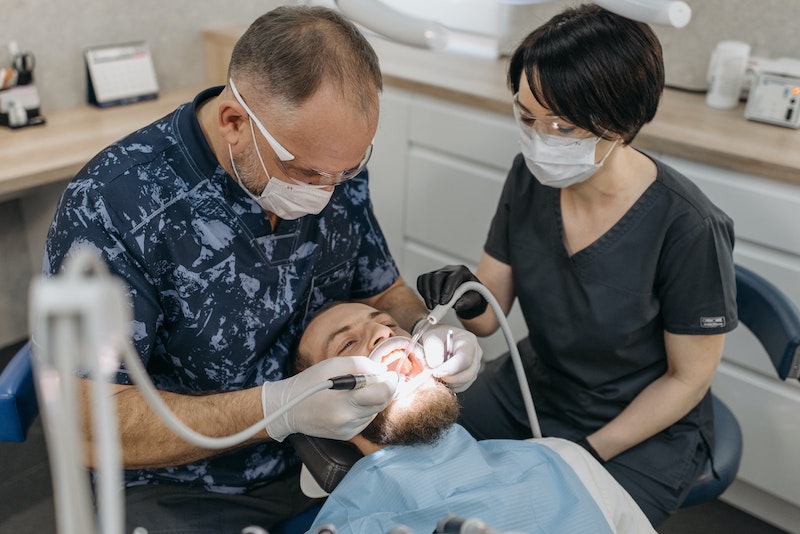
Most people go to the dentist for basic treatments like check-ups, cleanings, and fillings. But just like medical health doctors, the field of dentistry has many specialties, each with its focus, additional training requirements, and purpose.
While most of your dental experiences are likely to be handled by a general dentist, you may be referred to several specialists depending on your dental needs.
If you’ve ever wondered what these specialists do or how they’ll help you, you’ve come to the right place.
Let’s explore the various types of dentists together.
DDS Vs DMD
The average dentist you see for general oral care such as checkups and fillings are general dentists. If you’ve ever looked at the credentials of your general dentist, you may notice they’re either a DDS or a DMD.
A DMD has earned their degree in Doctor of Medicine in Dentistry, while a DDS has earned their degree in Doctor of Dental Surgery.
What’s the difference you ask? Well, they’re essentially the same! The difference has to do with what title a school attaches to its dental degrees.
Both a DDS and DMD completes the same schooling and goes through the same training to become fully licensed and practicing dentists.
A general dentist is considered a primary caregiver capable of providing a wide range of dental and oral care needs. The skillset of a general dentist may include:
- Routine dental exams
- Teeth cleaning
- X-rays
- Diagnosis
- Treatment planning
- Implants
- Root canals
- Oral cancer screenings
- Gum treatments for gum disease
- Repairs to broken teeth
- Crowns & bridges
- Fillings
Keep in mind that general dentistry includes training for many treatments that a specialist may also perform. As well, many dentists go on to do additional years of training to become specialists in various fields.
If your dentist does not offer the treatment you need, they will refer you to a dental specialist for examination, diagnosis, and treatment.
Types of Dentists or Dental specialists
Sometimes your general dentist will refer you to a specialist, either because they do not have the specialised training needed, or feel you are better off seeing a specialist.
These dental specialists undergo 2-4 years of additional training in various dental focuses. This additional training ensures that you get the best care possible for any required treatment.
Pedodontist (paediatric dentist)
A pedodontist or paediatric dentist is a dentist who specialises in treating children. These dentists perform both comprehensive dental procedures and have advanced knowledge in preventative care for babies, children, and youth.
Much of their training also focuses on establishing good relationships with children to facilitate positive associations, which is a key factor for maintaining good oral care habits and ensure they continue to schedule regular dental exams as they grow older.
Pedodontists also often work with patients who have a range of special needs.
Orthodontist

An orthodontist deals with issues relating to misalignment of your teeth, jaw, and bite.
There are a variety of orthodontic devices used by orthodontists to treat a range of alignment and other oral issues. From braces to clear aligners, retainers, and Invisalign, these devices all help straighten teeth and reduce the chances of oral health problems. If you have teeth that are missing, crooked, crowded, or too far spaced apart, an orthodontist will use these devices to gently force your teeth into the desired position over time.
Oral Surgeon
Oral surgeons are most commonly referred to when performing invasive tooth extractions such as wisdom teeth. However, an oral surgeon (also known as a maxillofacial surgeon) does much more than wisdom teeth. An oral surgeon may also be called to perform a range of other treatments including:
- Other teeth extractions
- Corrective jaw surgery
- Facial trauma treatment
- Biopsies
- Bone grafting
- Implant procedures
- TMJ (temporomandibular joint) surgeries
Endodontist
You’re likely to see an endodontist when you have a complex root canal procedure. An endodontist treats sick, dying, or dead teeth to save the tooth from needing extraction. They are experts with the blood vessels and cells inside your tooth called the pulp.
When a tooth becomes infected, the endodontist drills a small hole into your tooth to extract the dead or dying pulp and saves the tooth from being removed.
Periodontist
Periodontists focus on the prevention, diagnosis, and treatment of your gums, bone, and other tissues supporting your teeth. Most patients who are referred to a periodontist already have advanced gum disease (periodontal disease) which requires immediate treatment. Their goal is to save teeth from extraction by improving the health of the gums and bones that support them.
Some of their duties may include treating severe gum inflammation, installing dental implants, and performing skin grafts for cosmetic purposes. If you want treatment for a “gummy” smile, then a periodontist can help.
Prosthodontist

This dental specialist makes artificial prosthetic replacements for missing teeth. They have the expert knowledge to make both removable and non-removable fittings that restore both the function and appearance of your smile.
These oral devices can include several types of replacements including:
- Dental crowns
- Dental bridges
- Dentures
- Dental implants
- Veneers
Prosthodontists are specialists in tooth replacements for cosmetic reasons or traumatic reconstruction and work closely with the dental laboratories that create these custom devices.
Final Thoughts
No matter what dental treatment you need, there’s a trained dental professional to help. Your general dentist will always be your primary contact point for determining if you need a referral to a dental specialist.
Recent Posts
- Castor Oil For Better Hair Growth: Is It Myth Or Fact?
- Exploring the Differences Between Sermorelin, Ipamorelin, Ibutamoren, GHRP2, and GHRP6: Understanding Their Role in Human Growth Hormone Regulation
- Unraveling the Mystery: Understanding the Causes and Prognosis of Ventricular Tachycardia Without Apparent Heart Disease
- Understanding Grandparents’ Rights in Oklahoma: Navigating Visitation and Legal Protections
- 10 Reasons to Consider Hypnotherapy for Your Health

